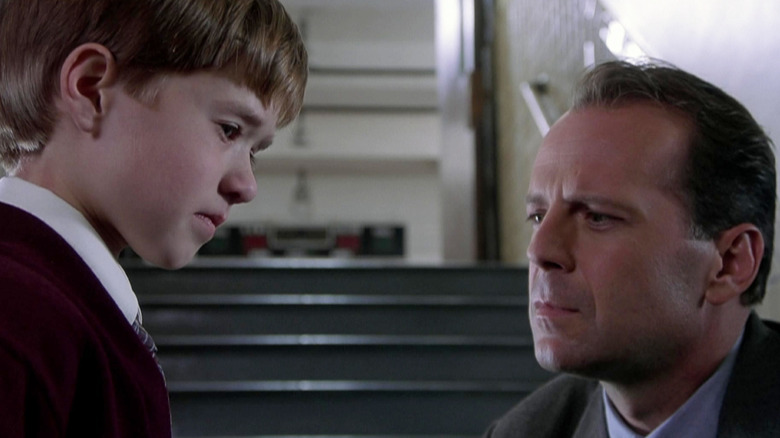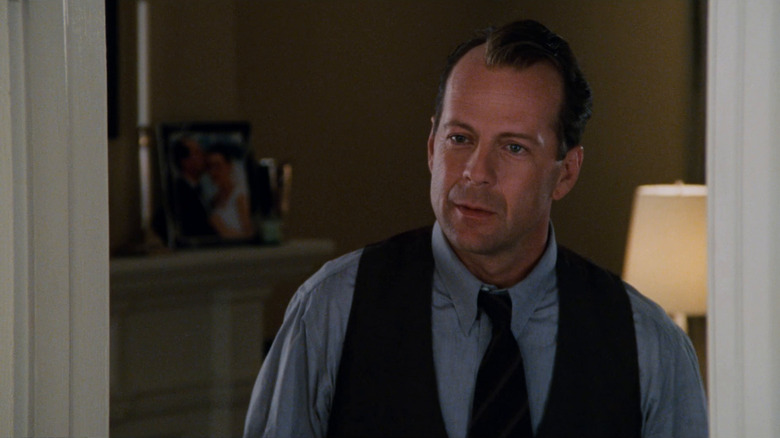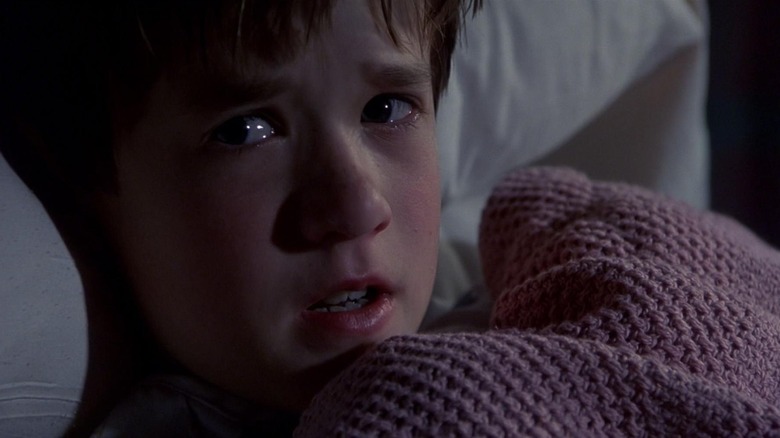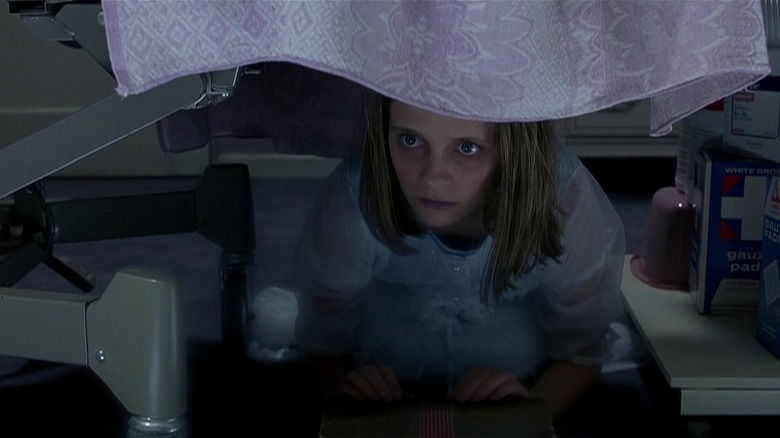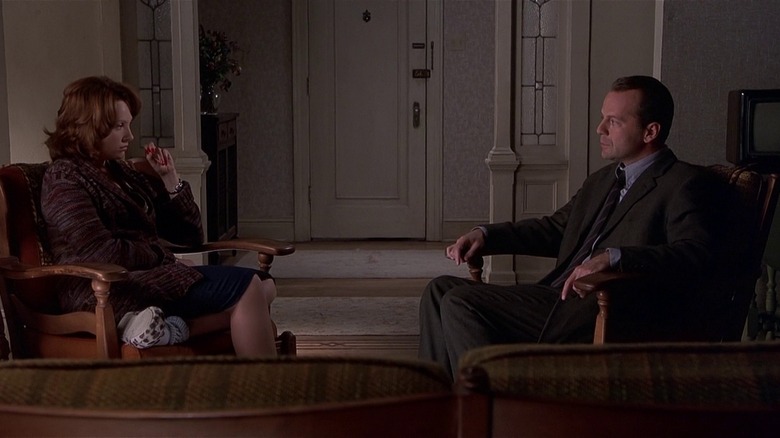25 Years Ago, The Sixth Sense Became The Must-See Box Office Sensation Of The '90s
(Welcome to Tales from the Box Office, our column that examines box office miracles, disasters, and everything in between, as well as what we can learn from them.)
If one were to just say the word "twist" with no context whatsoever, there's a better than decent chance that one would instantly think of M. Night Shyamalan. The filmmaker has become synonymous with the twists in his films, so much so that it might be warranted to include a picture of him next to the word in any dictionary. That all started with 1999's "The Sixth Sense," which remains not only the biggest film of his illustrious career, but also one of the biggest word-of-mouth hits in history.
"'I have to be attached as director, and we're going to have a $1 million minimum bid. If they want to read it, they have to know that this is going to start at $1 million,'" Shyamalan told The Hollywood Reporter in 2019, recalling what he told his agents in 1997 when he took the script for the film out to studios. It was a bold move for a guy whose first theatrical release, 1998's "Wide Awake," hardly registered at the box office.
"'It's fine if no one wants to pay that money for it. If they don't want to make it, I will shelve it,'" the filmmaker added. "You have to not be bluffing when you say stuff like that. I wasn't bluffing. I'll do other things, but I won't make the movie." Shyamalan's confidence would prove warranted well beyond even the wildest imaginations of anyone involved.
In this week's Tales from the Box Office, we're looking back at "The Sixth Sense" in honor of its 25th anniversary. We'll go over how Disney got involved, how Bruce Willis was cast in the lead role, Shyamalan's meteoric rise to the top of Hollywood's A-list, what happened when the movie hit theaters, how it is still impacting the filmmaker's career to this day, and what lessons we can learn from it all these years later. Let's dig in, shall we?
The movie: The Sixth Sense
The film centers on a young boy named Cole (Haley Joel Osment) who is constantly being visited by ghosts with unresolved problems. He is too afraid to tell anyone, save for child psychologist Dr. Malcolm Crowe (Bruce Willis). Crowe tries to uncover the truth about Cole's supernatural abilities, which has major consequences for both of them. Spoiler alert: Crowe is actually dead and is just one of the ghosts visiting Cole, something both Crowe and the audience don't figure out until the very end of the film.
That signature twist sang on the page, so much so that a bidding war broke out over Shyamalan's script. It was impressive for a guy who was best known for his script work in Hollywood, including a rewrite of "Stuart Little," which had yet to be released. David Vogel, the president of Disney at the time, was enraptured by the script and outbid the rest of the town, offering between $2 and $3 million for the rights, as well as a promise to let Shyamalan direct. It was unheard of at the time. It was also a decision that ultimately got Vogel fired, as none of this was approved by the higher ups at the company.
To mitigate things, Spyglass Entertainment came on board to finance the production, leaving Disney with a mere 12.5% of the film's total profits as a distribution fee. Another spoiler alert: This came back to bite the Mouse House in the ass pretty badly when "The Sixth Sense" became an even bigger hit than the groundbreaking sci-fi flick "The Matrix" ($463.5 million worldwide), or just about anything else released in 1999. That year is often considered to be the greatest single year in cinema history. Shyamalan had a big part to play in all of that.
M. Night Shyamalan executes The Sixth Sense to perfection
Shyamalan was given a budget in the $40 million range to work with. Again, especially when adjusting for inflation, that was a healthy amount. He was also given one of the biggest stars in the world in Willis, who was coming off one of the biggest hits of his career in "Armageddon." Both films were part of a three-picture deal the actor was contracted to make for Disney after "Broadway Brawler" fell apart midway through production when Willis decided to exit the project unceremoniously.
A big part of this had to do with subverting expectations. Not just hiding the movie's big twist in plain sight, but giving Willis the opposite of an action hero role. As Shyamalan explained in that same 2019 THR interview:
"He was so excited about doing that. He's the guy who didn't have the gun. When Donnie's [Wahlberg] character shows up in the beginning, he doesn't know what to do. He loved playing somebody who didn't know what to do. I think that just kind of launched us into a more vulnerable, complicated version of Bruce that's so lovely."
Having a killer script is one thing. Executing that script is another. From casting the then-unknown Osment in the role of Cole to making a wildly scary movie with a PG-13 rating, Shyamalan proved he had the goods to become a hugely successful commercial filmmaker. "I remember [my friend] getting really scared by it. That was the first time I was like, 'Oh, wow, this is what this movie does to people,'" Osment once recalled in a 2019 interview, explaining how he came to realize just how scary the movie was. Audiences all over the world were going to discover that very same thing for themselves.
The financial journey
Disney, which released the film domestically via its now-defunct Buena Vista label, had to market the film effectively without giving away the big twist. Fortunately, they were able to lean on the strength of Osment's performance, including the famous "I see dead people line," as well as some of the memorably haunting moments. That, coupled with the star power of Willis, built some strong initial buzz. However, it was the "must-see" word of mouth from moviegoers that was the real secret sauce here.
Against strong reviews from critics, "The Sixth Sense" opened on the weekend of August 6, 1999. It debuted at number one with a whopping $26.6 million haul above another surprise breakout horror hit in "The Blair Witch Project," which was in its fourth weekend. The film also steamrolled "The Iron Giant," which bombed in its debut, though it did eventually go on to achieve classic status. That weekend was just the beginning of a truly epic run.
Shyamalan's buzzy horror flick ended up topping the charts for five weeks straight, peaking over Labor Day weekend with a huge $29.2 million haul. It became the first movie since "Titanic" to make $20 million or more through its first five weekends. So much of it had to do with audiences not only craving to see the twist for themselves in a pre-internet age, but wanting to see the movie again to see how they were deceived the first time around. There was no "Wait for streaming in a few weeks." It was either wait months to see it on home video or see it again in theaters. Audiences resoundingly chose the theatrical experience here.
"The Sixth Sense" finished its original run with $293.5 million domestically to go with a gigantic $379.3 million internationally for a grand total of $672.8 million. It was second only to "Star Wars: Episode I — The Phantom Menace" ($924.3 million) that year, coming in well above the likes of Disney's "Toy Story 2" ($487 million) and "Tarzan" ($448.1 million).
Shyamalan is still living in the shadow of The Sixth Sense
Disney only got that 12.5% distribution fee, which cost the studio an untold fortune in profits. In any event, Shyamalan became the next big thing in Hollywood, as the film also earned six Oscar nominations, including Best Director and Best Picture. Osment also snagged a Best Supporting Actor nomination, becoming one of the youngest actors ever to do so. Toni Collette additionally landed a Best Supporting Actress nod for her role as Cole's mother. It's that rare blend of commercial and critical acclaim that studios dream of but rarely ever achieve.
Unfortunately for Shyamalan, coming out of the gate with success like this is a bit of a double-edged sword. 25 years removed and "The Sixth Sense" remains the best-reviewed movie of his career. It's not unlike Orson Welles having to reside in the shadow of "Citizen Kane" for the rest of his career. Fortunately, Shyamalan lives on, but he must do so in the shadow of his breakout feature, regardless of the successes — and failures — that have followed.
Shyamalan re-teamed with Willis for "Unbreakable" in 2000, which was met with largely positive reviews but may have been a little ahead of its time, given the superhero theme. 2002's "Signs" was another all-around hit for the filmmaker, but one that applied more undue pressure. Newsweek famously labeled him as "The Next Spielberg" on the cover of the magazine. That's a lot to live up to.
Things began to get a little wobbly with "The Village" before they straight-up plummeted with the much-maligned "Lady in the Water" in 2006. That started a rocky period for the filmmaker, with "The Happening," "The Last Airbender," and the big-budget sci-fi flop "After Earth" following through to 2013. Shyamalan was always judged against that initial success, and there's no question that haunted him for a long time. Fortunately, those old wounds have long since healed, at least commercially speaking.
The lessons contained within
Shyamalan stripped things down in 2015 with "The Visit," which became his best-reviewed movie in years and a nice little low-budget horror hit, taking in $98.4 million against a mere $5 million budget, which the filmmaker put up himself. That led to "Split," which was an even bigger hit, in addition to being a stealthy sequel to "Unbreakable." While Shyamalan has continued to be hit-and-miss with critics, with his latest film "Trap" becoming a divisive thrill-ride, he has undoubtedly pulled himself out of those dog days in the mid-2000s and early 2010s.
It's not as though Shyamalan is immune to everything that has been said about him over the years. The man has suffered scathing reviews, perhaps never worse than his ill-fated "The Last Airbender." During an interview for that film in 2010, the filmmaker acknowledged it all with a surprising amount of grace and self-awareness:
"You can lose your mind a little bit, going on Saturday from being an idiot to Sunday being a genius. But it gives you perspective. But luckily for me, it's not something I can fight. It's not my fight to fight. I'm defenseless, it's the audience, if they choose to fight for me, then they fight for me. And they have through my career, and I'm honored to have that relationship with them. And I'll keep fighting for that relationship. And maybe, 20 years from now, I'll get a good review, I'll sit here together, and be like, 'I got a good review! Woohoo!'"
For better and for worse, Shyamalan has remained true to himself for the last 25 years. He partially self-finances his work, bets on his ideas, and puts originality into the world at a time when franchises dominate the landscape. In retrospect, it's hard not to respect the man's perseverance and refusal to collapse under the weight of impossible expectations.
